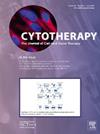Engineering Next-Generation Mesothelin CAR-T cells by Harnessing Naïve and Early Memory T cells
IF 3.7
3区 医学
Q2 BIOTECHNOLOGY & APPLIED MICROBIOLOGY
引用次数: 0
Abstract
Background & Aim
CAR-T cells for the treatment of patients with solid tumors, including mesothelin CAR-Ts targeting mesothelioma, have shown limited clinical efficacy to date. It is hypothesized that one barrier to response is lack of T cell persistence, a quality associated with naïve and early memory T-cells. We therefore designed a GMP process to manufacture mesothelin CAR-Ts directly from these minimally differentiated T cells. CD62L is expressed on naïve, stem/central memory, and central memory T-cells but is also expressed on monocytes and B cells. Because monocytes can inhibit transduction and expansion, we depleted CD14+ monocytes prior to CD62L enrichment using a two-step magnetic selection.
Methodology
A total of 4 mononuclear cell (MNC) apheresis products from healthy donors were incubated with CD14 magnetic beads on the Sepax C-Pro, depleted for CD14+ monocytes on the CliniMACS Plus, and enriched for CD62L+ cells on the CliniMACS Prodigy. T-cells were activated using TransAct stimulation reagent plus IL-2, IL-7, and IL-15, followed by lentiviral transduction with a CAR expressing a novel scFv (hYP218) targeting the membrane-proximal domain of mesothelin. Cells were expanded on the CliniMACS Prodigy for 7-9 days, with a target harvest of day 7 for clinical products.
Results
Using the two-step magnetic selection process, we purified CD62L+ cells from an initial frequency of 54 - 76% CD62L+ of CD3+ to ≥99% CD62L+ of CD3+ (98% of total), while also depleting ≥94% of CD14+ monocytes, demonstrating successful purification. From 8.8 ± 1.5 × 109 total MNCs, we isolated 1.8 ± 0.5 × 109 CD62L+CD3+ T-cells, recovering 58% of CD62L+CD3+ cells on average during enrichment. We next initiated 55 × 106 T-cells into culture, which expanded to 2.2 ± 0.4 × 109 cells by day 7. T-cell purity increased from 83.1 ± 4.1% CD3+ on day 0 to above 96% on day 7 with 40-60% transduction at MOI=3.4. Approximately 98% of transduced T-cells expressed CD62L at harvest, suggesting that the naïve/early memory phenotype is maintained.
Conclusion
This innovative manufacturing process for generating mesothelin CAR-T cells demonstrates consistency and robustness, yielding a final product enriched with CD62L+ T cells, high transduction efficiency, and full compliance with all safety release criteria. This process will be utilized in a Phase 1 dose escalation study of patients with mesothelin-expressing tumors including mesothelioma as well as lung, thymic, colorectal, pancreatic, and gastric cancers.
利用Naïve和早期记忆T细胞设计下一代间皮素CAR-T细胞
背景,用于治疗实体肿瘤患者的AimCAR-T细胞,包括靶向间皮瘤的间皮素car - t细胞,迄今为止显示出有限的临床疗效。据推测,反应的一个障碍是缺乏T细胞持久性,这是一种与naïve和早期记忆T细胞相关的品质。因此,我们设计了一种GMP工艺,直接从这些最小分化的T细胞中制造间皮素car -T。CD62L在naïve、干细胞/中枢记忆和中枢记忆t细胞上表达,但也在单核细胞和B细胞上表达。由于单核细胞可以抑制转导和扩增,我们在CD62L富集之前使用两步磁选择去除CD14+单核细胞。方法将健康供者的4个单核细胞(MNC)分离产物与CD14磁珠在Sepax C-Pro上孵育,在CliniMACS Plus上去除CD14+单核细胞,在CliniMACS Prodigy上富集CD62L+细胞。使用TransAct刺激试剂加IL-2、IL-7和IL-15激活t细胞,然后用CAR慢病毒转导表达靶向间皮素膜近端结构域的新型scFv (hYP218)。细胞在CliniMACS Prodigy上扩增7-9天,临床产品的目标收获时间为第7天。结果采用两步磁选择工艺,我们纯化了CD62L+细胞,从初始频率为CD3+的54 - 76%的CD62L+到CD3+的≥99%的CD62L+(占总数的98%),同时也消耗了≥94%的CD14+单核细胞,证明纯化成功。从总共8.8±1.5 × 109个MNCs中,我们分离出1.8±0.5 × 109个CD62L+CD3+ t细胞,富集期间平均回收58%的CD62L+CD3+细胞。接下来,我们将55个 × 106个t细胞导入培养中,在第7天扩增到2.2±0.4 × 109个细胞。CD3+的t细胞纯度从第0天的83.1±4.1%增加到第7天的96%以上,MOI=3.4时转导率为40-60%。大约98%的转导t细胞在收获时表达CD62L,这表明naïve/早期记忆表型得以维持。结论:这种创新的间皮素CAR-T细胞制造工艺具有一致性和稳健性,最终产品富含CD62L+ T细胞,转导效率高,完全符合所有安全释放标准。该工艺将用于间皮瘤、肺癌、胸腺癌、结直肠癌、胰腺癌和胃癌等表达间皮瘤患者的1期剂量递增研究。
本文章由计算机程序翻译,如有差异,请以英文原文为准。
求助全文
约1分钟内获得全文
求助全文
来源期刊

Cytotherapy
医学-生物工程与应用微生物
CiteScore
6.30
自引率
4.40%
发文量
683
审稿时长
49 days
期刊介绍:
The journal brings readers the latest developments in the fast moving field of cellular therapy in man. This includes cell therapy for cancer, immune disorders, inherited diseases, tissue repair and regenerative medicine. The journal covers the science, translational development and treatment with variety of cell types including hematopoietic stem cells, immune cells (dendritic cells, NK, cells, T cells, antigen presenting cells) mesenchymal stromal cells, adipose cells, nerve, muscle, vascular and endothelial cells, and induced pluripotential stem cells. We also welcome manuscripts on subcellular derivatives such as exosomes. A specific focus is on translational research that brings cell therapy to the clinic. Cytotherapy publishes original papers, reviews, position papers editorials, commentaries and letters to the editor. We welcome "Protocols in Cytotherapy" bringing standard operating procedure for production specific cell types for clinical use within the reach of the readership.
 求助内容:
求助内容: 应助结果提醒方式:
应助结果提醒方式:


